Business Books to Watch in June
June 05, 2019
In order of their release dates, these are some of the books we'll be exploring further in June.
In order of their release dates, these are some of the books we'll be exploring further in June.
 Tech Boss Lady: How to Start-up, Disrupt, and Thrive as a Female Founder by Adriana Gascoigne, Seal Press
Tech Boss Lady: How to Start-up, Disrupt, and Thrive as a Female Founder by Adriana Gascoigne, Seal Press
The founder of Girls in Tech offers first-hand accounts of the realities of startup life, with the very best advice from top women entrepreneurs.
You know startups are hard, but what is it like to fail, or have a falling out with your co-founder, or to go through hundreds of pitches in an effort get funded? In Tech Boss Lady, Adriana Gascoigne dives into the gritty, raw side of startups. She shares her own story—of defying Silicon Valley's boy's club and founding the largest organization for female entrepreneurs in the world—as well as candid true tales from more than 20 leading women in tech. The result: a no-nonsense guide for the entrepreneur, intrapreneur and Tech Boss Lady within each of us.
Gascoigne goes behind the scenes of some of Silicon Valley's hottest brands to discuss topics like failure, funding, growth hacking, and what it's like to be a first-time CEO. Rising entrepreneurs will find inspiration and actionable advice, and experienced tech employees will appreciate Gascoigne's refreshingly real take on Silicon Valley: the good, the bad, the ugly, and ultimately-the hopeful.
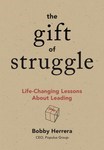 The Gift of Struggle: Life-Changing Lessons About Leading by Bobby Herrera, Bard Press
The Gift of Struggle: Life-Changing Lessons About Leading by Bobby Herrera, Bard Press
Bobby Herrera shares twelve stories from his leadership journey as co-founder and CEO of Populus Group.
Every leader has stories about the challenges they have faced and struggles they have overcome. In the moment, those situations require strength, patience, perseverance and courage. With time, those struggles provide us lessons for how to be better leaders. Bobby Herrera learned to see those struggles as gifts. As the co-founder and CEO of Populus Group, Bobby never imagined the challenges of building a $500 million organization that serves tens of thousands of people. Throughout his life, he experienced the divergence between the intentional leader he wanted to be, and the less engaged version of him that showed up at the office every day. One day at a company meeting, he decided to share a story about one of his first struggles as a young adult. That story, a pivotal experience that had transformed Bobby’s life, inspired his employees with its radical transparency, humility and the idealism of Bobby’s dreams for the company. In The Gift of Struggle, Bobby shares twelve of those stories from his leadership journey. Each chapter shares the details of the story, the broader lesson any leader can apply, a set of questions to reflect on, and an afterword for how the story later unfolded in Bobby’s life. Building on Bobby’s efforts, this book inspires readers to find their own stories, share their gifts of struggle with others, and become the leader they imagine they can be.
 Master Your Motivation: Three Scientific Truths for Achieving Your Goals by Susan Fowler, Berrett-Koehler
Master Your Motivation: Three Scientific Truths for Achieving Your Goals by Susan Fowler, Berrett-Koehler
If you want to accomplish what’s important to you, discipline and willpower won’t get you where you need to go. In this iconoclastic new book, Susan Fowler reveals compelling insights and actions to help you master and maintain your motivation.
Motivation is at the heart of everything you do and everything you want to do but don’t. Unfortunately, the ways we typically motivate ourselves don’t work. Relying on sheer determination eventually becomes exhausting—it’s not sustainable. And even setting goals can backfire—if you’re not setting them for the right reasons.
Susan Fowler says motivation is energy, and what matters is the quality, not the quantity. Traditional “motivators” such as fear, guilt, or the promise of a reward provide low-quality, short-term energy. Drawing on the latest empirical research, she proves that high-quality, optimal motivation is a skill that you can learn and apply.
Science tells us that satisfying three basic needs—for choice, connection, and competence—is essential to optimal motivation. You need to feel like you’ve picked your path, not that you’re being driven down it. Your goal should be linked to people or a purpose meaningful to you. And you want to continually learn and grow.
Through practical exercises and eye-opening stories, Fowler shows you how to identify and shift the quality of your motivation. The skill to master your motivation is important—it may be your greatest opportunity to evolve, grow in wisdom, and be the light the world so desperately needs.
 Flex: The Art and Science of Leadership in a Changing World by Jeffrey Hull, PhD, TarcherPerigee
Flex: The Art and Science of Leadership in a Changing World by Jeffrey Hull, PhD, TarcherPerigee
From one of the world’s preeminent leadership coaches, an insightful, indispensable guide to effective leadership.
For the first time, leadership expert Jeffrey Hull shares the secrets, strategies, and science underlying his, and his clients’, successes. Interweaving real-life stories with practical tips and the latest evidence-based research, he equips readers with the insights they need to thrive in today’s world.
We are in the age of the post-heroic leader. Once, to move up the corporate ladder and succeed at the top, you simply had to set goals, motivate the troops, delegate to underlings, and groom a successor—probably one who looked and behaved just like you. But this white knight has become an anachronism. Whether a person is twenty-five or fifty, if they’re leading a team now, chances are that they’re managing a kaleidoscope of people from a variety of cultures, across a range of ages, all of whom are wired together 24/7. These changing demographics and structures have led to a seismic shift in terms of the tools needed to successfully manage and grow within a company: charisma and strategic thinking abilities now matter less than qualities such as vulnerability and relatability.
Based on his popular classes with Harvard Medical School physicians and New York University business students, Hull has identified the six key elements that leaders in this new workplace need to succeed, known as F.I.E.R.C.E.: Flexibility, Intentionality, Emotional Intelligence, Realness, Collaboration, and Engagement. From start-ups to universities to Fortune 500 companies, he’s been able to help leaders across the board develop the skill sets that have advanced their careers and won them accolades.
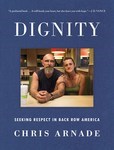 Dignity: Seeking Respect in Back Row America by Chris Arnade, Sentinal
Dignity: Seeking Respect in Back Row America by Chris Arnade, Sentinal
With stark photo essays and unforgettable true stories, Chris Arnade cuts through “expert” pontification on inequality, addiction, and poverty to allow those who have been left behind to define themselves on their own terms.
After abandoning his Wall Street career, Chris Arnade decided to document poverty and addiction in the Bronx. He began interviewing, photographing, and becoming close friends with homeless addicts, and spent hours in drug dens and McDonald’s. Then he started driving across America to see how the rest of the country compared. He found the same types of stories everywhere, across lines of race, ethnicity, religion, and geography.
The people he got to know, from Alabama and California to Maine and Nevada, gave Arnade a new respect for the dignity and resilience of what he calls America’s Back Row—those who lack the credentials and advantages of the so-called meritocratic upper class. The strivers in the Front Row, with their advanced degrees and upward mobility, see the Back Row’s values as worthless. They scorn anyone who stays in a dying town or city as foolish, and mock anyone who clings to religion or tradition as naïve.
As Takeesha, a woman in the Bronx, told Arnade, she wants to be seen as she sees herself: “a prostitute, a mother of six, and a child of God.” This book is his attempt to help the rest of us truly see, hear, and respect millions of people who’ve been left behind.
 The Beautiful No: And Other Tales of Trial, Transcendence, and Transformation by Sheri Salata, HarperWave
The Beautiful No: And Other Tales of Trial, Transcendence, and Transformation by Sheri Salata, HarperWave
The former executive producer of The Oprah Winfrey Show and co-host of the popular podcast series This is Fifty with Sheri + Nancy shares candid insights and transformational wisdom from her storybook career and her dramatic middle of life reinvention.
What happens when you’ve dedicated decades to your dream job but left all your other dreams gathering dust on the shelf?
This was the question facing Sheri Salata. For over twenty years, Sheri worked first on The Oprah Winfrey Show and then on the OWN cable network turnaround. It was a storybook career that came with enormous rewards—and ultimately huge self-inflicted costs, leaving her emotionally and physically depleted.
After years of telling other people’s stories and inspiring them to turn their lives around, Sheri decided it was time to “produce” her own life transformation. With her 50th birthday in the rearview mirror, she embarked on a journey of radical self-care.
In The Beautiful No, Sheri takes a tender and unflinching look at her career, her love life, her spirituality, her body, her entire life journey, inviting readers to join her as she creates a personal recipe for living the life of her dreams. Armed with everything she’s learned from working with some of the most prolific wisdom keepers of our time, she shares how she began to rebuild the pillars of her life.
Packed with practical gems and laugh-out-loud moments, Sheri’s story is a blueprint of personal renewal and everyday magic. Building on the inspiring insights of bestsellers such as Eat, Pray, Love, Wild, and A Year of Yes, The Beautiful No makes clear it’s never too late to live the life or your dreams.
 Agent of Influence: How to Use Spy Skills to Persuade Anyone, Sell Anything, and Build a Successful Business by Jason Hanson, Dey Street Books
Agent of Influence: How to Use Spy Skills to Persuade Anyone, Sell Anything, and Build a Successful Business by Jason Hanson, Dey Street Books
Discover how to use proven spy techniques to bolster your business strategies—from self-advocation to selling to interviewing—and ultimately make more money with this unique guide from the winner of Shark Tank and bestselling author of Spy Secrets That Can Save Your Life.
Spies communicate in code and employ a range of techniques to survive in diverse environments. But to be effective they must be business savvy—they must know how to successfully persuade others. In fact, intelligence agents are among the best salesmen in the world.
Whether we realize it or not, each one of us is a salesman. Every day, you sell yourself—your talents, your value, and your ideas to colleagues, to friends, and even to your partner. At the office you maneuver in code to receive a promotion, a higher salary, professional recognition. Now, you can learn to sell yourself even better.
In Agent of Influence, Jason Hanson, a former CIA special agent and founder of Spy Escape School, reveals how anyone can use spy tactics for increased success, from learning how to strategically plan your day to mastering the steps you’ll need to embrace challenges and set achievable, personal goals. He teaches you how to develop a winning sales personality and target the perfect business opportunity using the SADR cycle—”spotting,” “assessing,” “developing,” and “recruiting.” With this invaluable and unique handbook, you will become a more productive, confidant professional or entrepreneur.
In our evolving age of entrepreneurship, corporate careers, and self-run businesses, Jason’s message will appeal to those looking for a competitive leg up, and who entrust the insider secrets of spy practice to take them there.
 The Weather Machine: A Journey Inside the Forecast by Andrew Blum, Ecco
The Weather Machine: A Journey Inside the Forecast by Andrew Blum, Ecco
From the acclaimed author of Tubes, a lively and surprising tour through the global network that predicts our weather, the people behind it, and what it reveals about our climate and our planet.
The weather is the foundation of our daily lives. It’s a staple of small talk, the app on our smartphones, and often the first thing we check each morning. Yet behind all these humble interactions is the largest and most elaborate piece of infrastructure human beings have ever constructed—a triumph of both science and global cooperation. But what is the weather machine, and who created it?
In The Weather Machine, Andrew Blum takes readers on a fascinating journey through the people, places, and tools of forecasting, exploring how the weather went from something we simply observed to something we could actually predict. As he travels across the planet, he visits some of the oldest and most important weather stations and watches the newest satellites blast off. He explores the dogged efforts of forecasters to create a supercomputer model of the atmosphere, while trying to grasp the ongoing relevance of TV weather forecasters.
In the increasingly unpredictable world of climate change, correctly understanding the weather is vital. Written with the sharp wit and infectious curiosity Andrew Blum is known for, The Weather Machine pulls back the curtain on a universal part of our everyday lives, illuminating our changing relationships with technology, the planet, and our global community.
 Life Finds a Way: What Evolution Teaches Us About Creativity by Andreas Wagner, Basic Books
Life Finds a Way: What Evolution Teaches Us About Creativity by Andreas Wagner, Basic Books
How the principles of biological innovation can help us overcome creative challenges in art, business, and science.
In Life Finds a Way, biologist Andreas Wagner reveals the deep symmetry between innovation in biological evolution and human cultural creativity. Rarely is either a linear climb to perfection--instead, "progress" is typically marked by a sequence of peaks, plateaus, and pitfalls. For instance, in Picasso's forty-some iterations of Guernica, we see the same combination of small steps, incessant reshuffling, and large, almost reckless, leaps that characterize the way evolution transformed a dinosaur's grasping claw into a condor's soaring wing. By understanding these principles, we can also better realize our own creative potential to find new solutions to adversity.
Ultimately, Life Finds a Way offers a new framework for the nature of creativity, enabling us to better adapt, grow, and change in art, business, or science—that is, in life.
 One Giant Leap: The Impossible Mission That Flew Us to the Moon by Charles Fishman, Simon & Schuster
One Giant Leap: The Impossible Mission That Flew Us to the Moon by Charles Fishman, Simon & Schuster
The remarkable story of the trailblazers and the ordinary Americans on the front lines of the epic mission to reach the moon.
President John F. Kennedy astonished the world on May 25, 1961, when he announced to Congress that the United States should land a man on the Moon by 1970. No group was more surprised than the scientists and engineers at NASA, who suddenly had less than a decade to invent space travel.
When Kennedy announced that goal, no one knew how to navigate to the Moon. No one knew how to build a rocket big enough to reach the Moon, or how to build a computer small enough (and powerful enough) to fly a spaceship there. No one knew what the surface of the Moon was like, or what astronauts could eat as they flew there. On the day of Kennedy’s historic speech, America had a total of fifteen minutes of spaceflight experience—with just five of those minutes outside the atmosphere. Russian dogs had more time in space than U.S. astronauts. Over the next decade, more than 400,000 scientists, engineers, and factory workers would send 24 astronauts to the Moon. Each hour of space flight would require one million hours of work back on Earth to get America to the Moon on July 20, 1969.
Fifty years later, One Giant Leap is the sweeping, definitive behind-the-scenes account of the furious race to complete one of mankind’s greatest achievements. It’s a story filled with surprises—from the item the astronauts almost forgot to take with them (the American flag), to the extraordinary impact Apollo would have back on Earth, and on the way we live today.
Charles Fishman introduces readers to the men and women who had to solve 10,000 problems before astronauts could reach the Moon. From the research labs of MIT, where the eccentric and legendary pioneer Charles Draper created the tools to fly the Apollo spaceships, to the factories where dozens of women sewed spacesuits, parachutes, and even computer hardware by hand, Fishman captures the exceptional feats of these ordinary Americans. One Giant Leap is the captivating story of men and women charged with changing the world as we knew it—their leaders, their triumphs, their near disasters, all of which led to arguably the greatest success story, and the greatest adventure story, of the twentieth century.
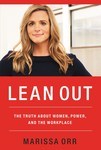 Lean Out: The Truth About Women, Power, and the Workplace by Marissa Orr, HarperCollins Leadership
Lean Out: The Truth About Women, Power, and the Workplace by Marissa Orr, HarperCollins Leadership
Marissa Orr, Facebook and Google veteran, explains why our efforts to close the gender gap have failed and posits that overhauling the business world's paradigm of a "successful leader" will result in greater diversity in corporate leadership and foster healthier work environments for both women and men.
After Orr, a single mother of three, spent fifteen years working at today's top tech giants like Facebook and Google, she became frustrated with the companies' efforts to promote more women. The lectures, workshops, and trainings delivered the subtle message that success requires adopting the behavior of her male colleagues. Orr realized that closing the gender gap in corporate America won't improve women's lives, because the goal stems from a male worldview, built on the premise of female inferiority—and that's why the numbers at the top have barely budged, despite thirty years of trying.
Based on in-depth research and eye-opening personal experiences, author and tech industry veteran Marissa Orr explains why our pursuit to close the gender gap has come at the expense of female well-being. Suspecting that many women around her felt the same, she wrote a series of lectures encouraging women to define success on their own terms. She quickly discovered that her revolutionary message resonates with women, as her workshop attendance exploded 1,500 percent over the course of a single year.
Lean Out offers contrarian, often humorous insights to this critical global dialogue and provides a pathway for both individuals and companies to promote a more inclusive workplace that benefits all employees.
 You're It: Crisis, Change, and How to Lead When It Matters Most by Leonard J. Marcus, Eric J. McNulty, Joseph M. Henderson, Barry C. Dorn, PublicAffairs
You're It: Crisis, Change, and How to Lead When It Matters Most by Leonard J. Marcus, Eric J. McNulty, Joseph M. Henderson, Barry C. Dorn, PublicAffairs
Become a better crisis leader while equipping yourself with the tools for every day transformative leadership.
Today, in an instant, leaders can find themselves face-to-face with crisis. An active shooter. A media controversy. A data breach. In You're It, the faculty of the National Preparedness Leadership Initiative at Harvard University takes you to the front lines of some of the toughest decisions facing our nation's leaders—from how to mobilize during a hurricane or in the aftermath of a bombing to halting a raging pandemic. They also take readers through the tough decision-making inside the world's largest companies, hottest startups, and leading nonprofits.
The authors introduce readers to the pragmatic model and methods of Meta-Leadership. They show you how to understand what is happening during a moment of crisis and change, what to do about it, and how to hone these skills to lead high-performing teams. Then, when crisis hits, you can pivot to be the leader people follow when it matters most.
A book for turbulent times, You're It is essential reading for anyone preparing to lead an adaptive team through crisis and change.
 Reboot: Leadership and the Art of Growing Up by Jerry Colonna, Harper Business
Reboot: Leadership and the Art of Growing Up by Jerry Colonna, Harper Business
One of the start-up world’s most in-demand executive coaches—hailed as the “CEO Whisperer” (Wired)—reveals why radical self-inquiry is critical to professional success and healthy relationships in all realms of life.
Jerry Colonna helps start-up CEOs make peace with their demons, the psychological habits and behavioral patterns that have helped them to succeed—molding them into highly accomplished individuals—yet have been detrimental to their relationships and ultimate well-being. Now, this venture capitalist turned executive coach shares his unusual yet highly effective blend of Buddhism, Jungian therapy, and entrepreneurial straight talk to help leaders overcome their own psychological traumas. Reboot is a journey of radical self-inquiry, helping you to reset your life by sorting through the emotional baggage that is holding you back professionally, and even more important, in your relationships.
Jerry has taught CEOs and their top teams to realize their potential by using the raw material of their lives to find meaning, to build healthy interpersonal bonds, and to become more compassionate and bold leaders. In Reboot, he inspires everyone to hold themselves responsible for their choices and for the possibility of truly achieving their dreams.
Work does not have to destroy us. Work can be the way in which we achieve our fullest self, Jerry firmly believes. What we need, sometimes, is a chance to reset our goals and to reconnect with our deepest selves and with each other. Reboot moves and empowers us to begin this journey.
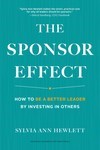 The Sponsor Effect: How to Be a Better Leader by Investing in Others by Sylvia Ann Hewlett, Harvard Business Review Press
The Sponsor Effect: How to Be a Better Leader by Investing in Others by Sylvia Ann Hewlett, Harvard Business Review Press
Are you investing in the right people?
Many people know the benefit of finding a sponsor--someone who goes beyond traditional mentorship to partner with a junior-level employee to help build their skills, advocate for them when opportunities arise, and open doors. But few realize that being a sponsor is just as important to career growth as finding one.
According to new research from economist and thought leader Sylvia Ann Hewlett, senior executives who sponsor rising talent are 53 percent more likely to be promoted than those who don't. Similarly, middle-level managers who have proteges are 167 percent more likely to be given stretch assignments. Well-chosen proteges contribute stellar performance, steadfast loyalty, and capabilities that you, the sponsor, may lack, thus increasing how fast and how far you can go.
But how do you find standout proteges, let alone develop them so that they're able to come through for you and your organization?
This book has the answers you need. Combining powerful new data and rich examples drawn from in-depth interviews with leaders from companies such as Unilever, Aetna, Blizzard Entertainment, and EY, The Sponsor Effect provides a seven-step playbook for how you can become a successful sponsor. You'll learn to:
- Identify the right mix of proteges
- Include those with differing perspectives
- Inspire your proteges and ignite their ambition
- Instruct them to develop key skill sets
- Inspect your picks for performance and loyalty
- Instigate a deal, detailing the terms of a relationship
- Invest three ways and reap the rewards
Along the way, you'll discover the enormous benefits of investing in these valuable relationships.
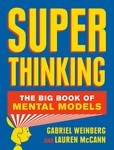 Super Thinking: The Big Book of Mental Models by Gabriel Weinberg & Lauren McCann, Portfolio
Super Thinking: The Big Book of Mental Models by Gabriel Weinberg & Lauren McCann, Portfolio
The world’s greatest problem-solvers, forecasters, and decision-makers all rely on a set of frameworks and shortcuts that help them cut through complexity and separate good ideas from bad ones. They’re called mental models, and you can find them in dense textbooks on psychology, physics, economics, and more.
Or, you can just read Super Thinking, a fun, illustrated guide to every mental model you could possibly need.
How can mental models help you? Well, here are just a few examples…
If you’ve ever been overwhelmed by a to-do list that’s grown too long, maybe you need the Eisenhower Decision Matrix to help you prioritize.
Use the 5 Whys model to better understand people’s motivations or get to the root cause of a problem.
Before concluding that your colleague who messes up your projects is out to sabotage you, consider Hanlon’s Razor for an alternative explanation.
Ever sat through a bad movie just because you paid a lot for the ticket? You might be falling prey to Sunk Cost Fallacy.
Set up Forcing Functions, like standing meeting or deadlines, to help grease the wheels for changes you want to occur.
So, the next time you find yourself faced with a difficult decision or just trying to understand a complex situation, let Super Thinking upgrade your brain with mental models.
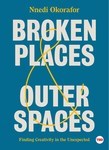 Broken Places & Outer Spaces: Finding Creativity in the Unexpected by Nnedi Okorafor, TED Books
Broken Places & Outer Spaces: Finding Creativity in the Unexpected by Nnedi Okorafor, TED Books
A powerful journey from star athlete to sudden paralysis to creative awakening, award-winning science fiction writer Nnedi Okorafor shows that what we think are our limitations have the potential to become our greatest strengths.
Nnedi Okorafor was never supposed to be paralyzed. A college track star and budding entomologist, Nnedi’s lifelong battle with scoliosis was just a bump in her plan—something a simple operation would easily correct. But when Nnedi wakes from the surgery to find she can’t move her legs, her entire sense of self begins to waver. Confined to a hospital bed for months, unusual things begin to happen. Psychedelic bugs crawl her hospital walls; strange dreams visit her nightly. Nnedi begins to put these experiences into writing, conjuring up strange, fantastical stories. What Nnedi discovers during her confinement would prove to be the key to her life as a successful science fiction author: In science fiction, when something breaks, something greater often emerges from the cracks.
In Broken Places & Outer Spaces, Nnedi takes the reader on a journey from her hospital bed deep into her memories, from her painful first experiences with racism as a child in Chicago to her powerful visits to her parents’ hometown in Nigeria. From Frida Kahlo to Mary Shelly, she examines great artists and writers who have pushed through their limitations, using hardship to fuel their work. Through these compelling stories and her own, Nnedi reveals a universal truth: What we perceive as limitations have the potential to become our greatest strengths—far greater than when we were unbroken.
A guidebook for anyone eager to understand how their limitations might actually be used as a creative springboard, Broken Places & Outer Spaces is an inspiring look at how to open up new windows in your mind.
 Feedback (and Other Dirty Words): Why We Fear It, How to Fix It by M. Tamra Chandler & Laura Dowling Grealish, Berrett-Koehler
Feedback (and Other Dirty Words): Why We Fear It, How to Fix It by M. Tamra Chandler & Laura Dowling Grealish, Berrett-Koehler
A practical and irreverent guide to taking the sting out of feedback and reclaiming it as a motivating, empowering experience for everyone involved.
Feedback: the mere mention of the word can make our blood pressure rise and our defenses go up. For many of us, it’s a dirty word that we associate with bias, politics, resentment, and self-doubt. However, if we take a step back and think about its true intent, we realize that feedback needn’t be a bad thing. After all, understanding how others experience us provides valuable opportunities to learn and grow.
Authors M. Tamra Chandler and Laura Grealish explain how feedback got such a bad rap and how to recognize and minimize the negative physical and emotional responses that can erode trust and shut down communication. They offer a new and more ambitious definition of feedback, explore the roles we each play as Seeker, Extender, and Receiver, and introduce the three Fs of making feedback focused, fair, and frequent. You’ll also find valuable exercises and strategies, along with real-world examples that illustrate how you can put these ideas into action and join in the movement to fix feedback, once and for all.
When it’s done right, feedback has been proven to be the most effective means of improving communication and performance for you and your organization. It’s too important to give up, and with Chandler and Grealish’s help, you’ll be able to use it deftly, equitably, and effectively.
 The Technology Trap: Capital, Labor, and Power in the Age of Automation by Carl Benedikt Frey, Princeton University Press
The Technology Trap: Capital, Labor, and Power in the Age of Automation by Carl Benedikt Frey, Princeton University Press
How the history of technological revolutions can help us better understand economic and political polarization in the age of automation.
From the Industrial Revolution to the age of artificial intelligence, The Technology Trap takes a sweeping look at the history of technological progress and how it has radically shifted the distribution of economic and political power among society’s members. As Carl Benedikt Frey shows, the Industrial Revolution created unprecedented wealth and prosperity over the long run, but the immediate consequences of mechanization were devastating for large swaths of the population. Middle-income jobs withered, wages stagnated, the labor share of income fell, profits surged, and economic inequality skyrocketed. These trends, Frey documents, broadly mirror those in our current age of automation, which began with the Computer Revolution.
Just as the Industrial Revolution eventually brought about extraordinary benefits for society, artificial intelligence systems have the potential to do the same. But Frey argues that this depends on how the short term is managed. In the nineteenth century, workers violently expressed their concerns over machines taking their jobs. The Luddite uprisings joined a long wave of machinery riots that swept across Europe and China. Today’s despairing middle class has not resorted to physical force, but their frustration has led to rising populism and the increasing fragmentation of society. As middle-class jobs continue to come under pressure, there’s no assurance that positive attitudes to technology will persist.
The Industrial Revolution was a defining moment in history, but few grasped its enormous consequences at the time. The Technology Trap demonstrates that in the midst of another technological revolution, the lessons of the past can help us to more effectively face the present.
 Superpower: One Man's Quest to Transform American Energy by Russell Gold, Simon & Schuster
Superpower: One Man's Quest to Transform American Energy by Russell Gold, Simon & Schuster
In the ever more urgent quest for sources of renewable energy, meet the man boldly harnessing the natural forces that could power America’s future.
The United States is in the midst of an energy transition. We want to embrace renewable energy sources like wind and solar, and rely less on dirty fossil fuels. We don’t want to keep pumping so many heat-trapping gases into the atmosphere. Any transition from a North American power grid that uses mostly fossil fuels to one that is predominantly clean requires a massive building spree—billions of dollars’ worth.
Enter Michael Skelly, an infrastructure builder who began working on wind energy in 2000, when many considered the industry a joke. Eight years later, Skelly helped create the second largest wind power company in the United States—which was sold for $2 billion. Wind energy was no longer funny; it was well on its way to generating a substantial percentage of the electricity in the United States.
Acclaimed journalist and author of The Boom, “the best all-around book yet on fracking” (San Francisco Chronicle), Russell Gold tells the story of this pioneer whose innovations, struggles, and persistence represent the groundbreaking changes underway in American energy. In Superpower, we meet Skelly’s financial backers, a family that pivoted from oil exploration to renewable energy; the farmers ready to embrace the new “cash crop”; the landowners prepared to go to court to avoid looking at overhead wires; and utility executives who concoct fiendish ways to block renewable energy. Gold also shows how Skelly’s innovative company, Clean Line Energy, conceived the idea for a new power grid that would allow sunlight where abundant to light up homes thousands of miles away in cloudy states, and take wind from the Great Plains to keep air conditioners running in Atlanta. Thrilling, provocative, and important, Superpower is a fascinating look at America’s future.
 This Is Not a T-Shirt: A Brand, a Culture, a Community—a Life in Streetwear by Bobby Hundreds, MCD
This Is Not a T-Shirt: A Brand, a Culture, a Community—a Life in Streetwear by Bobby Hundreds, MCD
The story of The Hundreds and the precepts that made it an iconic streetwear brand by Bobby Hundreds himself.
Streetwear exists in that rarefied space where genuine “cool” coexists with big business; where a star designer might work simultaneously with Nike, a tattoo artist, Louis Vuitton, and a skateboard company. It’s the ubiquitous style of dress comprising hoodies, sneakers, and T-shirts that is worn by everyone from rappers to models to book editors. In the beginning, a few brands defined this style; fewer still survived as streetwear went mainstream. They are the OGs, the “heritage brands.” The Hundreds is one of those companies, and Bobby Hundreds is at the center of it all.
Bobby Kim, a.k.a. Bobby Hundreds, is the cofounder of The Hundreds, one of the first streetwear brands to go global. The creative force behind the brand, he has emerged as one of streetwear’s most prominent faces and voices. But growing up as one of the only Asian American kids in a mostly white and Latino community, a year ahead of his peers, with artistic aspirations, he reminds us that The Hundreds was started by outsiders and that that is truly the story of streetwear culture.
In This Is Not a T-Shirt, Bobby Hundreds cements his spot as a champion of an industry he helped create, celebrating the inspirations that birthed The Hundreds—from his Southern California, punk-DIY-tinged youth to the brand’s explosive success. His story is both inspiring memoir and business book—an expert assessment of the history and future of streetwear and the tale of his commitment to a creative vision and to building real community.





